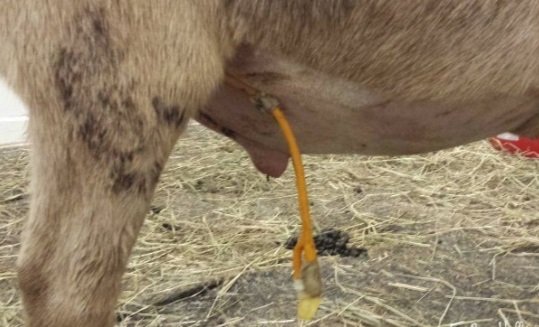Blocked Bladders in Goats
How do blocked bladders occur?
Blocked bladders occur commonly in goats due to urinary stones. These are also termed uroliths, with the technical term for a blocked bladder termed urolithiasis.
The most common site of obstruction occurs in the urethra, at an area called the sigmoid flexure or at the end, at the urethral process.
There are various kinds of stones that can form, all of which are associated with various dietary factors. Phosphate stones are the most common due to the natural alkaline pH of the urine, with diets high in cereal grains or concentrates contributing due to their high phosphate content. Silicate stones can also form on goats grazing high silica soils.
What are the signs?
The signs vary depending on the individual goat, the site of the obstruction and whether the obstruction is complete or partial (severity).
The first signs include: restlessness, getting up and down frequently, not wanting to eat and dribbling urine.
When the blockage becomes more severe, your goat may become depressed, have a distended abdomen and be straining to urinate with no production at all.
If you notice any of these signs ring the vet immediately!
How is it diagnosed?
Ultrasound picture of an enlarged goat bladder.
The first thing we will do is a full clinical examination of your goat to rule out any other diagnoses and to get a full picture of your goats health.
Follow up tests will often be recommended which may include:
Ultrasound: this allows us to visualise the bladder to see its size and condition, and to look for any stones that may be present in the urine.
Urine sampling: a urine sample can indicate if there are stones in the urine and if so, what kind of stones. We can also use the ultrasound to guide a needle into the bladder to take a sample if need be.
Blood tests: are used to analyse certain metabolites in the blood which will rise in cases of urolithiasis. These include nitrogen, creatinine, lactate, sodium and potassium.
Abdominal fluid sampling: if fluid is detected in the abdomen (either by ultrasound or physical examination) a sample may be taken to analyse for a couple of the metabolites mentioned above.
These are all tests that aid in the diagnosis of, and the outcome of urolithiasis.
How is it treated?
If caught early, the chances of a favorable outcome are much higher than if left until the condition is more severe. The outlook for a goat that cannot get up, is depressed, and has abnormal test results is unfortunately very poor.
Medical management includes the use of medications to alleviate pain and give your goat a chance of unblocking themself. Often this will not cure the condition but will give us time to run further tests and to stabilise the fluid and electrolyte status.
Surgical management would be considered in animals who do not respond well to medical management, but are also stable enough to undergo surgery. This would be evaluated from their physical examination and the results of other diagnostic tests. Surgery is more expensive and has varying success depending on the type of blockage and condition of the goat.
RVC’s Large Animal Vets performing a surgery on a male goat with a blocked bladder.
Goat after surgery with tube inserted into bladder.
How to prevent it?
Goats on high concentrate or grain diets are at greater risk of forming stones.
Reduce the amount of grain and concentrate fed (i.e., reduce the amount of phosphate).
Acidify the urine: you can do this by adding 10g ammonium chloride daily into your goats feed. This is a product you can get from us at the clinic.
Increasing urinary output by increasing water intake: this can be done by adding salt to your goats feed to increase the water intake.





